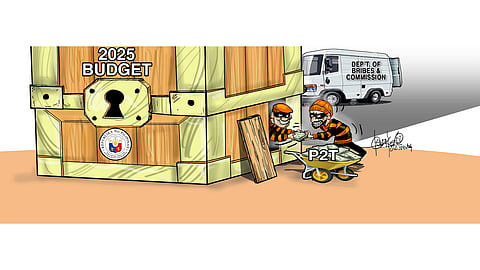
- NEWS
- the EDIT
- COMMENTARY
- BUSINESS
- LIFE
- SHOW
- ACTION
- GLOBAL GOALS
- SNAPS
- DYARYO TIRADA
- MORE

In the run-up to next year’s polls, groups that style themselves as critics of the administration, led by left-wingers, are pushing the narrative that corruption in government is at an all-time high.
Pointed to are the findings of multilateral lenders that show corruption in government diverts 20 percent of the budget to the pockets of public officials, both appointed and elected.
The estimated level of government thievery means P2 trillion of the P6.352-trillion national budget for next year will go to bribes and project commissions.
Thus, Filipinos suffer from poor-quality projects and services that are not commensurate with the taxes they pay.
While such a deplorable situation is a known affliction of the political system, the annual index that provides a credible gauge from businesses on irregularities in government shows that things are improving.
The country’s ranking in the global corruption index of Transparency International inched up one notch under the current administration.
Its ranking of 115th out of 180 countries, with a score of 34 in the latest Corruption Perceptions Index (CPI), was an improvement from the 116th in 2022 and up two spots from its worst-ever showing of 117th place in 2021. The Philippines ranked 115th in 2020, 113th in 2019 and 99th in 2018.
The score the country received in the latest poll indicated that it remained “on the lower end of the spectrum.”
Marcos’ critics downplayed the improvement, saying it was insignificant since “there was no anti-corruption program launched by the administration.”
What follows next is a reference to the administration of his father and the alleged ill-gotten wealth, accusations that hardly stood up in court as most of the complaints were dismissed.
Economists, however, concede that the improvement in ranking supports the business perception that a worsening condition has not happened.
Efforts to stamp out corruption are also behind the Bagong Pilipinas (New Philippines) campaign since Marcos stated that change must start with the government.
“Being lazy and slow is not acceptable in government. There is no place for them in public service,” he said in an address to launch the crusade.
“Services must be fast. Projects must be completed on time. Deadlines must be met per schedule,” he said. “Distress calls must be responded to without delay.”
Mr. Marcos recently signed Republic Act 12009 or the New Government Procurement Act (NGPA), which, along with the digitalization thrust, are the flagship anti-corruption measures of his administration.
The NGPA streamlines public procurement, which is considered one of the governance aspects most prone to corruption.
The law guarantees transparency through open contracting, wherein all stakeholders have access to procurement information, and observers from the private sector and civil society participate in all levels of procurement.
The law also requires the disclosure of beneficial ownership to identify the ultimate owner, prevent collusion in public procurement and hold public officials accountable for irregularities.
“Government procurement will be modern and innovative, more streamlined and efficient, and truly on par with global best practices,” Marcos said in his State of the Nation Address last July.
A new concept was introduced: the “Most Economically Advantageous Responsive Bid,” which considers the qualitative and economic values of a proposal as an alternative to the prevailing practice of choosing the “lowest calculated and responsive bid.”
“This frees us from the obligation of selecting the lowest bid when there is a better choice. This will ensure that we get not only the best prices but also the best deals for our clients, the Filipino people,” Mr. Marcos stressed.
Uprooting the source of the stealing of public funds may not generate the public attention that it deserves because of the complexity of the process, but this is nonetheless acknowledged by the business sector, which will be most affected by it.
